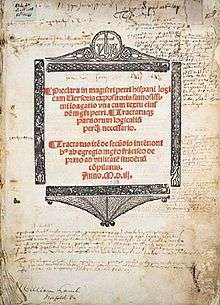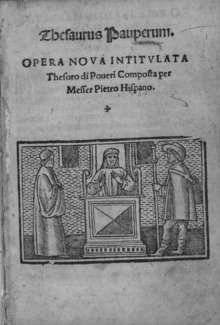Peter of Spain

Peter of Spain (Latin: Petrus Hispanus; Portuguese and Spanish: Pedro Hispano; fl. 13th century) was the author of the Tractatus, later known as the Summulae Logicales, an important medieval university textbook on Aristotelian logic. As the Latin Hispania was considered to include the entire Iberian peninsula, he is traditionally and usually identified with the Portuguese scholar and ecclesiastic Peter Juliani, who was elected Pope John XXI in 1276.[1][2] The identification is sometimes disputed, usually by Spanish authors, who claim the author of the Tractatus was a Castilian Blackfriar. He is also sometimes identified as Petrus Ferrandi Hispanus (d. 1254 x 1259).
Life
The author of the Tractatus is assumed to have studied under John Pagus.
Philosophical works
There are a large volume of manuscripts and printed editions of the Summulae Logicales, indicative of its great success throughout European universities well into the seventeenth century. Peter of Spain supported an investigation of teaching at the University of Paris which resulted in the Parisian bishop's Condemnation of 1277, which denounced Aristotelian propositions which conflicted with church doctrine.[3]
- Dialectica est ars artium, scientia scientiarum, ad omnium methodorum principia viam habens; sola enim dialectica probabiliter disputat de principiis omnium aliarum scientiarum, et ideo in acquisitione omnium aliarum scientiarum dialectica debet esse prior. "Dialectic [that is, logic, in Peter's terminology] is the art of arts, science of sciences, having the way to the principles of all methods; for in fact dialectic alone credibly argues about the principles of all other sciences, and therefore in [one's] acquisition (learning) of all other sciences dialectic must be prior." — Peter of Spain.[4]
Medical works

A Petrus Hispanus, usually identified as the same scholar,[5] was also credited as the author of a Commentary on Isaac, one of the foundational texts of clinical pharmacology. A Pedro Hispano was also credited with the Treasury of the Poor (Thesaurus Pauperum), a comprehensive recipe book for contraception and inducement of menstruation. Many of Peter’s recipes have been found to be surprisingly effective by contemporary research, and it is believed that women in antiquity had more control over their reproduction than previously believed.[6]
English translation
- Peter of Spain Summaries of Logic, Text, Translation, Introduction, and Notes by Brian P. Copenhaver, Calvin G. Normore, Terence Parsons, New York, Oxford University Press, 2014.
References
- ↑ Michael Haren, Medieval Thought (1985), p.148.
- ↑ For a more recent defense of the identity between Petrus Hispanus and Pope John XXI, see the preface of W. Degen and B Bapst (2006), Logische Abhandlungen, Munich.
- ↑ Principe, Lawrence M. (2002) History of Science: Antiquity to 1700. Lecture 19. The Teaching Company, Chantilly, VA)
- ↑ As quoted, for instance, in Papst Johannes XXI by Stapper, Richard, p. 5, collected in Kirchengeschichtliche Studien v. 4.
- ↑ Spruyt, Joke (2001), "Peter of Spain", Stanford Encyclopedia of Philosophy. Revised 2007. Eprint.
- ↑ John M. Riddle, Contraception and Abortion from the Ancient World to the Renaissance, Harvard University Press, 1994.
External links
- Spruyt, Joke. "Peter of Spain". Stanford Encyclopedia of Philosophy.